12 products
- Sweet Wine
- Gros Manseng, Petit Manseng
- Natural, Organic, Vegan-Friendly
- Medium Bodied
- 750ml
- 12.00% alc./vol
About the Winery
Clos Lapeyre

This family farm was traditionally dedicated to mixed farming with livestock, small fruits and grapes which were taken to the local cooperative. From 1985 onwards, the estate was turned over exclusively to viticulture when Jean-Bernard Larrieu gave birth to Clos Lapeyre.
Clos Lapeyre is a 12 ha domain owned by the Larrieu family, in Jurançon, Southwest France. It is situated south of Pau, nestling on steep slopes facing the Pyrenees. The vineyards are planted on terraces at an altitude of 250 m. Jean-Bernard Larrieu makes the wines, and his aim is produce wines that express the specificity of the grape varieties and the soils (pebbly clay/limestone and silex). The wines are certified Organic.
- White Wine
- Chardonnay
- Organic
- Dry
- Medium Bodied
- 750ml
- 13% alc./vol
About the Winery
Domaine du Château de La Chaize
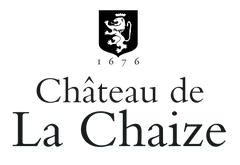
Château de La Chaize is among the oldest, most historic estates in Burgundy’s Beaujolais region. Cared for by the same family for nearly three and a half centuries, the estate has been passed on to new owners, the Gruy family, who are equally committed to managing the estate with the utmost care, while implementing an ambitious environmental plan. Among the many initiatives is the conversion of all vineyards to organic farming, the adoption of precision viticulture, reducing carbon their carbon footprint, and recycling every by-product from viti- and vinicultural activity, to achieve zero waste.
Founded in 1670 by the seneschal of Lyon François de la Chaize d’Aix, the main Château de la Chaize building and gardens were completed by Jules-Hardouin Mansart and André le Nôtre, respectively architect and gardener of the Château de Versailles. Château de la Chaize is among the oldest, most historic estates in Burgundy’s Beaujolais region. Boasting over 250 acres of vineyards, it is also one of the largest. It is today considered one of the most innovative estates in Burgundy. Among its forward- thinking practices is the adoption of eco-friendly farming techniques, commonly referred to as Agriculture Raisonnée. Chemical treatments have been reduced to a strict minimum, for example, and the growing of grass between rows has been re-introduced to enrich the soil and reduce erosion.
Press Reviews
Wine Enthusiast
90 points
This Beaujolais estate also has vines in Pouilly-Fuissé to the north. The wine has good minerality as well as ripe apple and spice. Lightly wood aged, it is a rich, structured and fruity. Drink the wine from late 2020. - Roger Voss
- White Wine
- Chenin Blanc
- Organic, Vegan-Friendly
- Dry
- Full Bodied
- 750ml
- 13.50% alc./vol
About the Winery
Château de Parnay
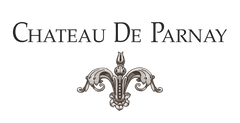
Château de Parnay is the flagship of the AOC Saumur Champigny. The property is located along the Loire river, classified as UNESCO World Heritage, on the most reputable clay and limestone terroirs of the appellation. The historic property was taken over by Mathias Levron & Régis Vincenot in 2006 with the aim of restoring the nobility of this special place.
Drawing their strength from the authenticity of their values, they now cultivate 50 hectares of vines with the aim of producing exceptional wines in a way that respects the environment. They have been certified organic since 2013 and are about to be certified biodynamic too.
The Clos of Chemin des Murs is the jewel of the property! Coming from the imagination of it's orginal owner, Antoine Cristal, this Clos was built, planted and cultivated according to an unprecedented technique. On this half hectare of Chenin Blanc, each vine was planted on the north face of a stone wall. Through a hole in the stone the vine crosses through the wall and allowing the grapes to grow facing the southern sunshine. The vine is said to have its 'foot in the cool and belly in the sun'.
Press Reviews
Wine Align
92 points - David Lawrason
This is from a leading Saumur producer of Loire chenin blanc with vines planted in calcerous clay soils near the Loire River outside of classical town. It is both rich and delicate, a juxtaposition I find in some of the world's best whites. It is not however an intense, flashy, acid and mineral driven chenin. Fermentation in neutral barrels has created a pale gold hue and softened the nose to gentle honeyed, spicy state along with ripe pear/apricot jam fruit. It is medium-full bodied, smooth and dry, almost creamy, with the grape's acidity and minerality arriving more on the finish. The complexity and length are excellent, with a touch of wood spice and bitterness as well. Tasted August 2022
94 points - John Szabo
2019: This leads with a terrific nose very much in the varietal/regional idiom, honeyed, floral, apple and lemon zest-scented, complex and exotic, not to mention stony. The palate displays a similar level of poise and composure, cool, transparent yet with a heavy freight of flavour , and terrific length. This is really quite extraordinary wine, delicious now, but surely capable of a decade or so in the cellar. Top notch. Tasted March 2019.
93 points - Michael Godel
2019: The rare and elusive 100 per cent chenin blanc from Samur makes full use of clay-calcaire-tuffeau soils for this dry and piqued white wine. So crunchy and expressive with an expansive character that fills the mouth by making contact withy every nerve and pour. Benchmark and controlled explosive example, rare or otherwise. Drink 2020-2025. Tasted March 2020.
91 points - David Lawrason
2019: It is rare to come across fine Saumur chenin, a central Loire Valley appellation overshadowed by Vouvray. This is mid-weight, dry and quite firm classic with a fairly generous nose of pear, spice, vague fresh herbs and wet stone. It becomes quite dry and somewhat grapefruity bitter on the finish, trailing solid minerality as well. Very good to excellent length. Tasted March 2020.
- Red Wine
- Mourvèdre / Monastrell, Syrah
- Natural, Organic, Vegan-Friendly
- Dry
- Full Bodied
- 750ml
- 13.5% alc./vol
About the Winery
Domaine Frédéric Brouca

Frédéric grew up in Normandy and met his Canadian wife Elaine at university in Lille, Northern France. They live a nomadic lifestyle (Canada, India, Singapore and USA) though Frédéric spends about half of his time in Faugères. Since early age, Frédéric had a calling for farming and the fierce desire to become a winegrower. After completing a Masters Degree in Finance in 2001, Frédéric went back to college for a Sommelier diploma and started his career as a Burgundy wine broker.
In late 2012, Frédéric and Elaine were fortunate to take over 25 acres of old vines in Faugères, organically farmed for twenty years and deeply rooted in schist soils.
2013 was the inaugural vintage for Domaine Frédéric Brouca. In his modest winery in the village of Laurens, Frédéric is creating a new vision for Faugères wines; fresh, vibrant and made without artifice. Nothing revolutionary, simply returning to our grandparent's ideology of farming and winemaking to craft 'Vins Vivants'. The Faugères Appellation is in the heart of Languedoc in the Hérault department. Here, winemaking dates back to the Greek times and was developed during the Roman Era. It wasn't until the early 1900's, however, that the wines became more widely known for its unique schist soils and moderate Mediterranean climate. These villages are heavily reliant on wine as an important part of their culture and economy.
The area is stunning with mountain views and close proximity to the Mediterranean Sea (20 miles / 30 kms). Faugères has a long history of responsible farming. It boasts the highest percentage of organic vineyards for any AOC in all of France with almost 50% of farmers making the choice.
Press Reviews
Wine Align
93 points - John Szabo
Clos Sauveplan is a blend of about 3/4 high density planted mourvèdre and the balance in half-century-old syrah from the lieu-dit of the same name, a plateau in the Faugères AOC in southern France. It's showing beautifully at the moment, rich, redolent of fresh black forest fruits, blackberry coulis, wild violets and cracked black peppercorn, really quite a tour de force. The palate is broad but fresh, impeccably balanced and so lively considering the warm vintage, declared at 12.5% alcohol but coming across as riper and denser than the numbers would imply. Tannins are silky and resolving nicely, and length, depth, and ultimately complexity, are excellent. One of Brouca's best to date I'd say; drink or hold a half dozen years - the stuffing augurs well for development. Tasted January 2024.
92 points - Michael Godel
The source for this co-ferment of mourvèdre and syrah is a “clos,” meaning an isolated walled vineyard in a lieu-dit called “Sauveplane”, plateau at the eastern limit of the Faugères appellation. A mix of 20 and 40 year-old vines, volcanic soils, some whole cluster fermentation. Exotically spiced, sweetly volatile. Low-level Brettanomyces, so bloody Faugères, exemplary and expected for a wine to speak up on behalf of this particular sense of place. The kind of Languedoc red that sommeliers and naturalists will share and swig with reckless abandon while those who have never tried this style and origin may be left to wonder in confounded disarray. Just know that this is very correct for producer, style and place. Drink 2024-2027. Tasted January 2023.
91 points - Sara d'Amato
From old vines farmed with minimal intervention on the plateau of "Sauveplane", a lieu-dit on the eastern edge of Faugères. Spontaneously co-fermented syrah and mourvèdre grapes are left unfined and unfiltered in the low-interventionist style of Fredric Brouca. Subsequently aged 13 months in oak resulting in very gentle spice and pleasantly mellow tannins. Offers a notable sense of place and varietal character. Relatively speaking, the wine is quite clean and still exhibits plenty of fresh fruit and very good length. Tasted January 2024.
- Red Wine
- Cabernet Franc
- Organic, Vegan-Friendly
- Dry
- Medium Bodied
- 750ml
- 13.50% alc./vol
About the Winery
Château de Parnay

Château de Parnay is the flagship of the AOC Saumur Champigny. The property is located along the Loire river, classified as UNESCO World Heritage, on the most reputable clay and limestone terroirs of the appellation. The historic property was taken over by Mathias Levron & Régis Vincenot in 2006 with the aim of restoring the nobility of this special place.
Drawing their strength from the authenticity of their values, they now cultivate 50 hectares of vines with the aim of producing exceptional wines in a way that respects the environment. They have been certified organic since 2013 and are about to be certified biodynamic too.
The Clos of Chemin des Murs is the jewel of the property! Coming from the imagination of it's orginal owner, Antoine Cristal, this Clos was built, planted and cultivated according to an unprecedented technique. On this half hectare of Chenin Blanc, each vine was planted on the north face of a stone wall. Through a hole in the stone the vine crosses through the wall and allowing the grapes to grow facing the southern sunshine. The vine is said to have its 'foot in the cool and belly in the sun'.
Press Reviews
Wine Align
93 points - Megha Jandhyala
This is a concentrated, complex, gracefully balanced cabernet franc. Notes of ripe red plums, blackberries, dark cherries, tobacco, dried leaves, and violets are interwoven here to form an elegant, engaging, and varietally representative flavour profile. The palate is densely flavoured but lithe, with fine-grained tannins and refreshing acids. The finish is long, layered, and captivating. Though it can be enjoyed now, I would cellar this for 2-3 years. Tasted January 2024.
93 points - David Lawrason
This is a serious cab franc indeed - not so much in terms of weight and power, but in its complexity, poise and length. It’s a deeply coloured for franc. The nose shows fine, ripe raspberry, perfectly pitched by fresh herbs, tobacco and violet. It is loosely structured mid-palate, and a touch warm, with slightly green tannin. The length is excellent. I would age it a year or three. Tasted January 2024
92 points - John Szabo, MS
Silky and refined, elegant but dense, this Saumur Champigny (cabernet franc) is a substantial and serious wine, with a high degree of textbook regional character, complete with a touch of green-herbal, varietal flavour. Tannins are fine and dusty, acids gently salty, and length good to very good. I'd suggest another year or two in the cellar to further refine the texture and develop complexity - potential I think is high. Tasted January 2024.
- White Wine
- Clairette, Grenache Blanc, Marsanne, Picpoul
- Organic, Vegan-Friendly
- Dry
- Full Bodied
- 750ml
- 13.50% alc./vol
About the Winery
Château de Montfaucon

Just across the Rhone river from the beautiful vineyards of Chateauneuf-du-Pape, the Lirac appellation extends itself on the low hills alongside the river. The history of Château de Montfaucon dates back to the 11th century when the castle's first tower was built. The castle's role in history was strategic; the Rhône River was the border between the French Kingdom and the Holy Roman German Empire. Montfaucon was one of many castles and fortresses along the Rhône River constructed to guard the border.
Rodolphe de Pins took over the family estate of Montfaucon in 1995 and subsequently rebuilt the winery and began practicing sustainable agriculture. He honed his winemaking skills in Barossa at Henschke and Vieux Telegraphe in Châteauneuf du Pape before returning to Lirac, so needless to say, his familiarity with the local varieties is well established.
Press Reviews
Wine Align
92 points - Michael Godel
Comtesse Madeleine may not be a Rhône original out of the Lirac appellation but my if it does not strike as something profound. The blend is 40 per cent each marsanne and clairette with (10) grenache blanc (plus perhaps a splash of picpoul) for a devilishly flinty white with a veritable scent of animal musk, like porchetta releasing that tell-tale aroma just after the skin begins to render at heat. This is the real deal in French white wine for which the blending process and subsequent elévage can pull out meaning to change the way wine will speak to those that are listening. Intently in this case and for great reason. Drink 2023-2026. Tasted February 2023.
92 points - Sarah d'Amato
A lively and characterful blend of marsanne, clairette and grenache blanc. Expressive and concise with freshness created through a combination of acidity and minerality. Features notes of rosebud, honeysuckle and ginger spice along with thyme, pear, lanolin, fresh fig and lemon. A compelling assemblage that brings new dimension and complexity through a succession of undulating sensorial waves. Honestly made with a light-handed touch. Balanced and lengthy. Tasted February 2023.
91 points - Megha Jandhyala
This is an aromatically expressive blend of clairette, grenache blanc, marsanne, and picpoul, from Lirac, an appellation that lies just across the Rhône river from famed Châteauneuf-du-Pape. I really like its glossy, smooth texture and flavours of apricots, lemons, and grapefruits, alongside subtle notes of vanilla and wet stones. The palate is integrated and balanced, with a sense of both richness and freshness. The finish is graceful and long-lasting. Tasted February 2023 by Critic Understudy Megha Jandhyala.
Decanter
90 points
Distinctly nutty from the oak, macadamia, gently grilled elements to the fruit. Good acidity. Little touch of honeycomb on the finish. Acidity is balanced. Drinking window 2020 - 2022.
- Red Wine, White Wine
- Cabernet Franc, Chenin Blanc
- Organic, Vegan-Friendly
- Dry
- Full Bodied
- 750ml
- 13.50% alc./vol
About the Winery
Château de Parnay

Château de Parnay is the flagship of the AOC Saumur Champigny. The property is located along the Loire river, classified as UNESCO World Heritage, on the most reputable clay and limestone terroirs of the appellation. The historic property was taken over by Mathias Levron & Régis Vincenot in 2006 with the aim of restoring the nobility of this special place.
Drawing their strength from the authenticity of their values, they now cultivate 50 hectares of vines with the aim of producing exceptional wines in a way that respects the environment. They have been certified organic since 2013 and are about to be certified biodynamic too.
The Clos of Chemin des Murs is the jewel of the property! Coming from the imagination of it's orginal owner, Antoine Cristal, this Clos was built, planted and cultivated according to an unprecedented technique. On this half hectare of Chenin Blanc, each vine was planted on the north face of a stone wall. Through a hole in the stone the vine crosses through the wall and allowing the grapes to grow facing the southern sunshine. The vine is said to have its 'foot in the cool and belly in the sun'.
Press Reviews
Wine Align
94 points - John Szabo
Château de Parnay Chemin des Murs Saumur Blanc 2019.
This leads with a terrific nose very much in the varietal/regional idiom, honeyed, floral, apple and lemon zest-scented, complex and exotic, not to mention stony. The palate displays a similar level of poise and composure, cool, transparent yet with a heavy freight of flavour , and terrific length. This is really quite extraordinary wine, delicious now, but surely capable of a decade or so in the cellar. Top notch. Tasted March 2019.
93 points - Michael Godel
Château de Parnay Chemin des Murs Saumur Blanc 2019.
The rare and elusive 100 per cent chenin blanc from Samur makes full use of clay-calcaire-tuffeau soils for this dry and piqued white wine. So crunchy and expressive with an expansive character that fills the mouth by making contact withy every nerve and pour. Benchmark and controlled explosive example, rare or otherwise. Drink 2020-2025. Tasted March 2020.
91 points - David Lawrason
Château de Parnay Chemin des Murs Saumur Blanc 2019.
It is rare to come across fine Saumur chenin, a central Loire Valley appellation overshadowed by Vouvray. This is mid-weight, dry and quite firm classic with a fairly generous nose of pear, spice, vague fresh herbs and wet stone. It becomes quite dry and somewhat grapefruity bitter on the finish, trailing solid minerality as well. Very good to excellent length. Tasted March 2020.
- White Wine
- Chardonnay
- Dry
- Residual Sugar: 2.00 g/l
- Medium Bodied
- 750ml
- 13.50% alc./vol
Press Reviews
Vinous Media
90 Points - Neal Martin
The 2022 Chablis Bougros Grand Cru is aged for 16 months in stainless steel and 500 litre barrels. It is pretty neutral on the nose and doesn't really engage the senses as I would have liked. The palate is balanced with a fine bead of acidity. It's taut and fresh, with a touch of sour lemon towards the finish. It's not bad, although its more Premier Cru than Grand Cru, to be honest. Tasted blind at the BIVB tasting in Chablis.
- White Wine
- Pinot Gris
- Biodynamic, Organic, Vegan-Friendly
- Dry
- Residual Sugar: 6.00 g/l
- Light Bodied
- 750ml
- 13.50% alc./vol
About the Winery
Domaine Muré
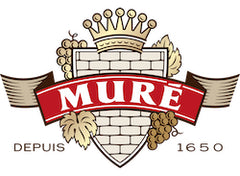
The Muré family has been winegrowers in the region of Rouffach since 1650. In 1935, Alfred Muré, René’s grandfather, bought 32 acres of family-monopole vineyard name Clos St. Landelin, an area that has been described as the best of Alsace Grand Cru since the 7th Century.
Today, René Muré, the 11th generation of the family, along with his children, Véronique and Thomas, are responsible for running their exceptional Grand Cru vineyard and neighbouring terroirs using biodynamic methods. Until this day, they persist in hand-picking every single grape, and focus on crafting wines that preserve the family’s credo. The resulting wines are some of Alsace's finest – powerful, elegant, and age-worthy.
Press Reviews
James Suckling
95 Points - Stuart Pigott, Senior Editor
At once ripe and rich, but with a lovely freshness and properly dry this is a stunning Alsace pinot gris with very ripe melon and citrus aromas, even a touch of orange blossom. Very long finely nunaced finish. From biodynamically grown grapes with Demeter certification. Drink or hold.
- White Wine
- Grenache Blanc, Roussanne
- Organic, Sustainable
- Dry
- Residual Sugar: 2.00 g/l
- Full Bodied
- 750ml
- 14.00% alc./vol
Press Reviews
Decanter
95 Points - Matt Walls
A touch smoky, flinty, this is tight and tense on the palate, dry and savoury. It's really quite focused, never overly fat, with a long, straight finish. Should age with interest. Domaine Chante Cigale continues to rise up the rankings of white Châteauneuf producers – consistently excellent. Perfect balance. Fermented then aged for 10 months in demi-muids. Just 850 bottles made.
- White Wine
- Chardonnay
- Sustainable
- Dry
- Residual Sugar: 2.00 g/l
- Medium Bodied
- 750ml
- 13.00% alc./vol
About the Winery
Groupe Bellene
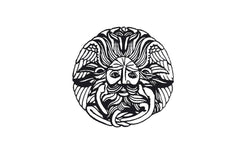
Led by Nicolas Potel in Beaune, Groupe Bellene is composed of the négociant arm Maison Roche de Bellene, the winery arm Domaine de Bellene, and a special back-vintage series under the Collection Bellenum label.
- Maison Roche de Bellene offers a complete range of wines, with an emphasis on individual terroirs from old vines of more than 40 years. All of the growers that Nicolas works with are either organic certified or sustainably farmed.
- Domaine de Bellene represents the wines that are produced and bottled from Nicolas Potel's private vineyard holdings.
- Collection Bellenum is a back vintage series that Nicolas Potel sourced from his friends in the region, offering a magnificent selection of bottled history. The wines have moved only twice in their lives, from the original cellar to Potel's and now to yours!
Nicolas Potel grew up at Volnay's Domaine Pousse d'Or, where his father worked. He trained abroad and returned home in 1996 to build a négociant business and started Maison Nicolas Potel, where he sourced grapes from good parcels, often working with the growers to improve the quality. By 2002, he was making 120 wines from 50 different appellations, and the rest is history!
- Red Wine
- Cabernet Franc, Merlot
- Dry
- Medium Bodied
- 750ml
- 13.50% alc./vol
About the Winery
Château du Moulin Noir
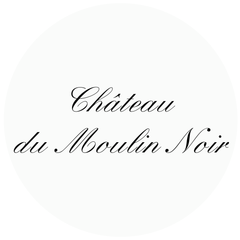
This beautiful right-bank Bordeaux estate consistently produces high-value, elegant and classic Merlot dominant wines and is considered one of the most famous Château of this appellation. Located in Montagne-Saint-Emilion, Château Moulin Noir consists of seven hectares of vineyards on clay and limestone soils.
This château owes its name to a family feuddating back to the Middle Ages. Two brothers were arguing about their father’s legacy with the youngest brother being incredibly jealous that everything went to the elder. He was so jealous that he burnt the château to the ground - Moulin Noir translates to “blackened Mill”.
Press Reviews
Wine Align
91 points - Sara d'Amato
This notably complex right bank blend from a satellite appellation of Saint-Emilion offers appealing savory notes along with a mineral, iron component as well as licorice spice. The oak treatment is wonderfully integrated with wood spice elevating the bright red fruit. Harmoniously matured, graceful and very elegant. The staying power of the finish is impressive. Drinking very well now. Tasted January 2019.













